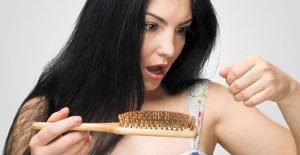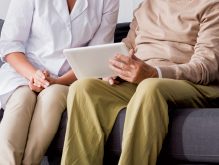By Alan J. Bauman, M.D. –
 It is no secret that our bodies change as we age – but many don’t realize that the same is true for our hair. When our skin ages, we develop wrinkles, fine lines, and age-spots. Similarly, when our hair ages, we can see thinning through loss of density, diameter and damage that leads to breakage.
It is no secret that our bodies change as we age – but many don’t realize that the same is true for our hair. When our skin ages, we develop wrinkles, fine lines, and age-spots. Similarly, when our hair ages, we can see thinning through loss of density, diameter and damage that leads to breakage.
There are approximately 200 genes that regulate hair growth. After puberty, the hereditary hair loss genes can take over—causing a gradual and progressive miniaturization of hair follicles. According the American Hair Loss Association, by 35, two-thirds of men will experience some degree of hair loss, and by the age of 50 approximately 85 percent of men have significantly thinning hair. And despite what some may believe, hair loss is not strictly a male problem. In fact, more than half of all women over 40 experience thinning hair, and they can inherit ‘hair loss genes’, just like men.
While genetics undoubtedly play a large role in how our hair will “age” and our susceptibility to hair loss, there are other factors that can accelerate the aging process. These factors can be broken down into two categories: intrinsic and extrinsic. Aging caused by the genes we inherit is called intrinsic (internal) aging, while extrinsic (external) aging and is caused by environmental factors.
Here are seven everyday factors that
can age your hair:
• Hot Tools – That super hot blow dryer or that flat iron used over and over again can degrade the proteins that make up your hair and its protective cuticle. Once the cuticle is damaged, moisture balance is disrupted and the hair is more prone to breakage. Turn down the heat or say ‘no’ to the compulsive flat ironing to protect your hair from thermal damage. Products like Pantene Thermal Protection can be helpful in decreasing friction and improving shine.
• Wet Combing – Combing your hair while it’s wet predisposes you to breakage because this is the time when your hair has the least amount of friction and is most likely to tangle and snap/break. Using a moisturizing and silkening conditioner (look for one with dimethicone) designed to decrease friction during this susceptible time is a good idea and to detangle with your fingers or wide toothed comb and allow to almost dry before styling.
• Oral Contraceptives – Not all birth control pills are the same, and different pills affect women differently. If you are sensitive to hair shedding or thinning due to hormone changes, a change in your birth control prescription can weaken your hair. If your prescription contains androgens and you are particularly ‘androgen sensitive’ this might be affecting your hair. If you are concerned about your androgen sensitivity, there is a simple and non-invasive doctor-prescribed genetic test available called HairDX.
• Harsh Chemicals – Many consumers don’t realize that chemicals like bleaches and dyes fundamentally change the structure of your hair, making it weaker and more susceptible to breakage and damage. Overusing these treatments can lead to severe breakage and loss of volume. The good news is that in most cases the damage to your ‘do caused by breakage is not permanent, but it will take a while for the damaged strands to grow back. The best advice is to avoid dyeing your hair too frequently – however, you can also try boosting your hair’s health by using low level laser therapy (like the Nutreve personal hand-held laser or the hands-free LaserCap) 30 minutes every other day and/or taking professional-grade nutritional supplements like Viviscal Professional or Appearex Biotin.
• Tight Braids /Hair Extensions – Chronically tight braids often seen in certain ethnic populations put excessive tension on the hair follicles under the skin by the constant pulling on hair fibers. Over the long-term, tight braids and even hair extensions can cause traction alopecia, a condition that permanently weakens or destroys hair follicles. Avoid hairstyles, wigs, weaves or hair extensions that pull on the follicles, because over time , you may have nothing left to attach the artificial hair to. Once your follicles are permanently damaged in this way, the only real option is to have a hair transplant.
• Crash Diets/Poor Nutrition – When it comes to healthy hair, it’s not just what you put on your tresses that count — it’s what you put in your body, too. If your body thinks it is starving, it won’t produce ‘luxury’ items like hair. Typically, you will see hair thinning and shedding approximately 6 to 12 weeks after the nutritional deprivation or “crash diet” begins. The condition is usually temporary but it can still take 6 to 10 months for the hair to return to normal.
• Medications – Certain medications like statin drugs, anti-depressants, anti-anxiety agents, anti-hypertensive medications or hormones such as thyroid or testosterone replacement as well as many other pharmaceuticals can have hair loss as a side effect. Check with your prescribing physician before changing your dose or discontinuing ANY medication.
While stopping important medications or giving up wigs or extensions may not be possible or probable (after all we all want to feel and look our best!) engaging in treatments that help to counteract these things can help prevent additional damage by keeping the follicles and fibers as strong and robust as they can be under the circumstances. By visiting with your Hair Restoration Physician for an accurate diagnosis and treatment plan regarding any hair damage or hair thinning can help you learn what your options might be. A hair loss specialist can scientifically measure hair breakage as well as track your hair’s response to medication with the HairCheck trichometer.
If your hair is aging and you are interested in learning how to stimulate healthy hair growth, it is important to consult with a board-certified hair restoration physician who can evaluate, measure and manage your aging-hair issues.
Hair Restoration for Men and Women – 1.877.BAUMAN9
Check Also
Trusted Homecare Agency: Serving Veterans with Free Supplemental Home Healthcare
When it comes to healthcare, veterans deserve the best care possible. For veterans seeking in-home …
 South Florida Health and Wellness Magazine Health and Wellness Articles
South Florida Health and Wellness Magazine Health and Wellness Articles




